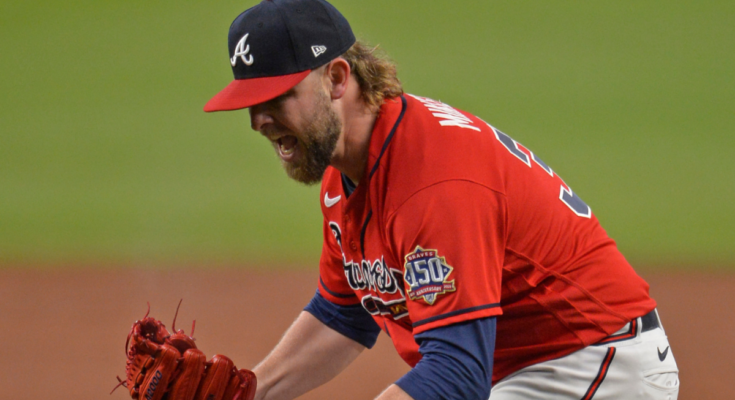Starter Ian Anderson and two Atlanta Braves relievers held the Houston Astros hitless through seven innings en route to a critical 2-0 win in Game 3 of the World Series on Friday night. The Braves now lead the best-of-seven series by a count of two games to one.
The 23-year-old rookie Anderson twirled five of those no-hit innings. He did so despite inconsistent command, and Braves manager Brian Snitker lifted him before he could face the tough Houston lineup a third time. The decision proved wise, as the Braves’ bullpen completed the shutout.
Houston finally managed its first hit when pinch-hitter Aledmys Diaz led off the eighth against Tyler Matzek by dumping a bloop single in front of Eddie Rosario in left. Thus ended what was the longest World Series no-hit bid since Jim Lonborg’s 7 2/3 hitless innings in Game 2 of the 1967 Fall Classic. The Astros finished with two hits on the night, as Alex Bregman led off the ninth inning with a single.
As for Anderson, he became the first starting pitcher in World Series history to be removed after throwing at least five no-hit innings. After four starts and 17 innings during these playoffs, Anderson now boasts an ERA of 1.59.
The first run of the game came on a one-out double by Austin Riley in the third inning that plated Freddie Freeman. Atlanta catcher Travis d’Arnaud added a valuable insurance run in the eighth when he hit a solo home run off Astros reliever Kendall Graveman. D’Arnaud now has five hits through the first three games of the series.
The Astros will try to even the series in Game 4 on Saturday night back at Truist Park. Here are five takeaways from Game 3.
Anderson was unhittable
Dominant? Not necessarily, but Ian Anderson tossed five no-hit innings against the Astros in Game 5, limiting the highest-scoring offense in baseball to three walks and a hit batter. He struck out four and threw nearly as many balls (37) as strikes (39). It is tied for the third longest no-hit bid by a starter in Braves postseason history:
- Derek Lowe: 5 1/3 innings vs. Giants in 2010 NLDS Game 4
- Bill James: 5 1/3 innings vs. Athletics in 1914 World Series Game 2
- Ian Anderson: 5 innings vs. Astros in 2021 World Series Game 3
- Tom Glavine: 5 innings vs. Cubs in 1998 NLDS Game 2
- Tom Glavine: 5 innings vs. Cleveland in 1995 World Series Game 6
Anderson’s no-hit bid is the second longest by a rookie in World Series history, trailing only former Giants righty Jeff Tesreau. Tesreau kept the Red Sox out of the hit column for 5 1/3 innings in Game 1 of the 1912 World Series.
According to Statcast, only one Astros batter put a ball in play with an expected batting average north of .270 (based on exit velocity and launch angle) against Anderson. That was Martin Maldonado’s lineout in the fifth inning. Similar batted balls go for a hit 67 percent of the time. Other than that, the Astros hit nothing hard against Anderson. Look at his pitch locations:
Baseball Savant
Can’t avoid the heart of the zone much better than that. Not surprisingly, Anderson held the Astros to an 85.6-mph average exit velocity, which is stellar. Hard to drive the ball when you get nothing in the wheelhouse and constantly have to reach.
Alas, Braves manager Brian Snitker did not want Anderson to go through the lineup a third time, so he was not allowed to continue the no-hit bid. It’s understandable. The Astros are excellent, and as effective as Anderson was, he wasn’t razor sharp. The bullpen was rested and Atlanta had their high leverage innings all lined up. Why try to steal outs with a starter who walked a tight rope all night? Either way, a historic outing for Anderson.
The bullpen was almost unhittable
It figures that Tyler Matzek, arguably the most dominant pitcher in either league this postseason, would surrender the hit that broke up the no-hitter. Aledmys Diaz lifted a soft floater to shallow left that dunked in front of Eddie Rosario for Houston’s first hit. Similar batted balls (based on exit velocity, launch angle, etc.) fall for a hit 44 percent of the time. Not well-struck, but well-placed.
Diaz’s hit came leading off the eighth inning. As we previously noted, the Braves are the first team to not allow a hit through seven innings in a World Series game since Jim Lonborg of the Red Sox did it all by himself in Game 2 of the 1967 World Series against the Cardinals. Lonborg lost his no-hit bid with two outs in the eighth inning and had to settle for the complete game one-hit shutout.
Alex Bregman led off the ninth inning with an opposite field single, though the next three batters made outs to end the game. Game 3 was the 175th game of 2021 for the Astros and only the fifth time they were held to two hits or fewer. The Mariners got them twice in April, the White Sox got them in July, the Athletics got them in September, and now the Braves got them in October.
The Astros went into Game 5 averaging 6.33 runs per game this postseason — they’d scored at least three runs in all 12 postseason games — yet five Braves pitchers held Houston to two soft singles in nine innings in Game 5. Anderson started and threw five no-hit innings, then was followed in order by AJ Minter, Luke Jackson, Tyler Matzek, and Will Smith. Nine innings of excellence.
Atlanta scratched across a run
And truth be told, it should have been more than one run. For a few innings there it felt like the Braves would regret scoring just one run in the third inning, though the one run held up. Like Anderson, Astros righty Luis Garcia was effectively wild in Game 5 — he walked four in 3 2/3 innings — though he needed 72 pitches to get 11 outs. He too was not allowed to face the lineup a third time.
Atlanta’s third-inning rally started with a walk by Eddie Rosario and a single by Freddie Freeman. Following an Ozzie Albies strike out, Austin Riley drove in the game’s first run with a double down the left field line. To the action footage:
Riley’s double brought home a run and also put runners at second and third bases with one out. Jorge Soler then walked to load the bases, but Garcia rebounded to get Adam Duvall to pop up in foul territory and Travis d’Arnaud to strike out, stranding the bases loaded. Some run expectancy numbers:
- Runners at first and second with no outs: 1.373 runs expected in the inning (following Freeman’s single)
- Bases loaded with one out: 1.520 runs expected in the inning (following Riley’s double, one run already in)
The Braves came in under the expected totals in both scenarios. Against a team like the Astros, you can’t waste opportunities like that and expect to not regret it, but Atlanta was able to thread the needle in Game 3. The run stood up even though the Braves went 1 for 6 with runners in scoring position in the game, and stranded nine runners.
d’Arnaud is building an MVP case
There is still a long way to go in this series, though Braves catcher Travis d’Arnaud has to be frontrunner for the World Series MVP award right now. He provided an enormous insurance run with an eighth inning solo home run against Astros righty Kendall Graveman in Game 3, turning a 1-0 lead into a 2-0 lead.
It was a cold and rainy night in Atlanta — far from baseball weather — and it takes some serious strength to drive a ball out to dead center field in those conditions. At 112.6 mph, the home run is both the hardest ball d’Arnaud hit this season and the hardest-hit ball Graveman allowed this season. It’s also the first home run Graveman allowed to a righty batter in 2021.
Through three games d’Arnaud is 5 for 12 (.417) with two home runs in the series. It’s the highest batting average of any regular on either team and d’Arnaud is the only player with multiple home runs in the series. Again, the World Series is a long way from over, but d’Arnaud is making an impact, and right now he’s the favorite for the MVP award.
The Braves have the edge
Historically, teams that take a 2-1 lead in a best-of-seven have gone on to win series 70 percent of the time, so the odds are in Atlanta’s favor at the moment. Of course, the World Series is far from over, especially with a few potentially chaotic bullpen games on deck the next few days. For now though, the Braves only need to win two of the next four games to clinch a title while the Astros must win three of four.






